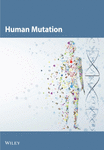Mucopolysaccharidosis type I: Identification of common mutations that cause Hurler and Scheie syndromes in Japanese populations
Abstract
α-L-Iduronidase (IDUA) deficiency (mucopolysaccharidosis type I; MPS-I) is an inborn error of lysosomal degradation of glycosaminoglycans that results in storage of undegraded glycosaminoglycans in lysosomes. Previous studies in Caucasian populations showed that (1) homozygosity or compound heterozygosity for the W402X and Q70X mutations are the common causes of MPS-I with a severe form (Hurler syndrome), and (2) the presence of R89Q may lead to a milder phenotype. We studied mutations in the IDUA gene from 19 MPS-I patients, including two pairs of siblings, with various clinical phenotypes (Hurler, 6 cases; Hurler/Scheie, 7 cases; Scheie, 6 cases). We report the presence of two common mutations that account for 42% of the 38 alleles in these patients. One is a novel 5-bp insertion between the thymidine at nt 704 and a cytosine at nt 705 (704ins5), which is seen only in the Japanese population. The other is a missense mutation, R89Q, which is also seen in Caucasians, although uncommonly. In the 19 Japanese MPS-I patients, the 704ins5 mutation accounted for 7 of 38 alleles (18%), while the R89Q accounted for 9 of 38 (24%). No Japanese patient was found to carry the W402X or Q70X alleles, the two most common MPS-I mutations in Caucasians. Homozygosity for the 704ins5 mutation is associated with a severe phenotype, and for the R89Q mutation with a mild phenotype. Compound heterozygosity for these two mutations produced an intermediate phenotype. Haplotype analysis using polymorphisms linked to the IDUA locus demonstrated that each mutation occurs on a different specific haplotype, suggesting that individuals with each of these common mutations derive from common founders. These data continue to document the molecular heterogeneity and racial differences in mutations in MPS-I. © 1996 Wiley-Liss, Inc.




